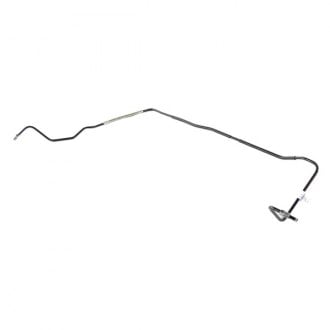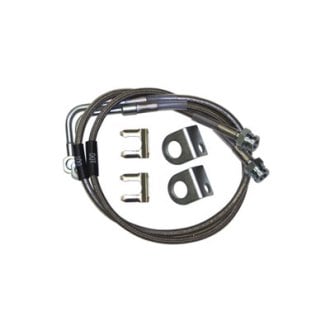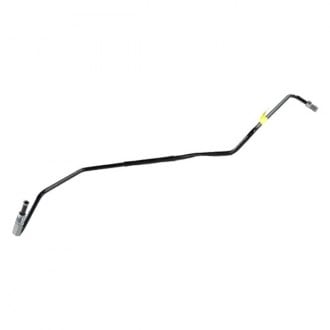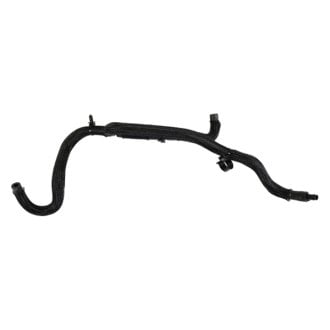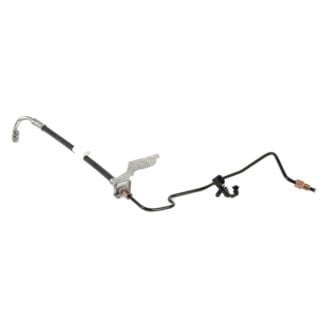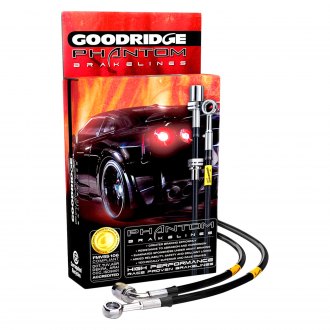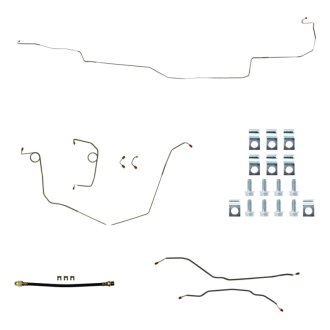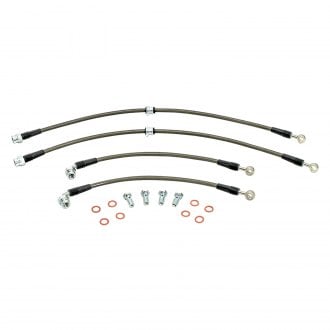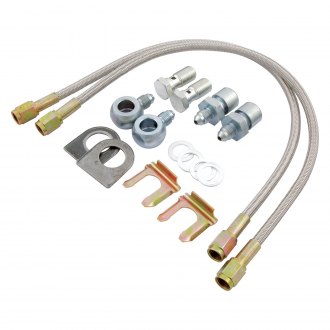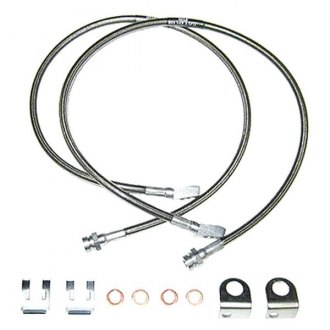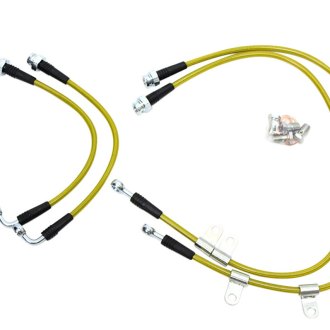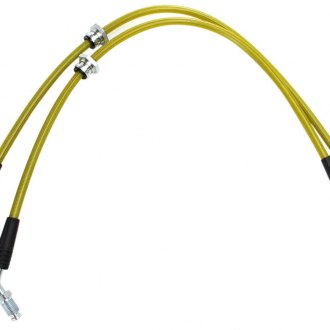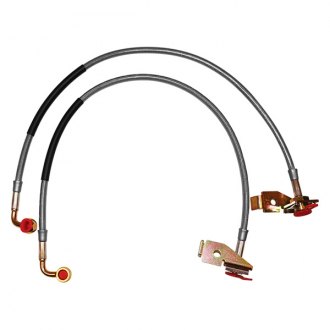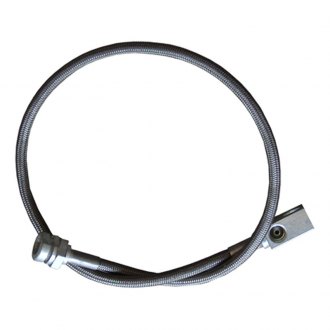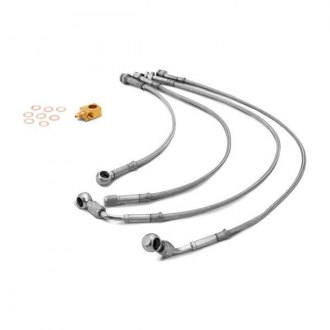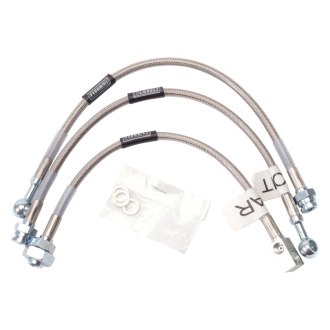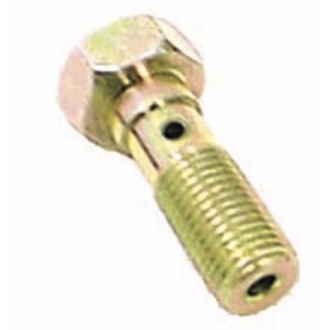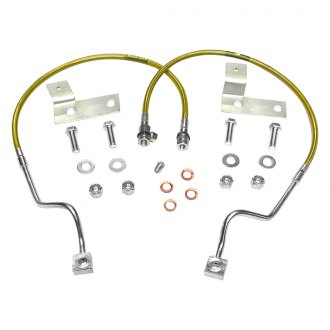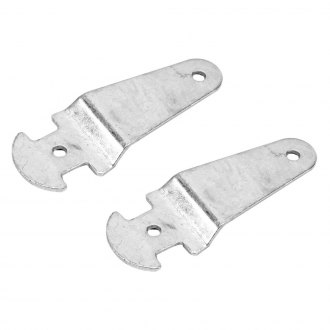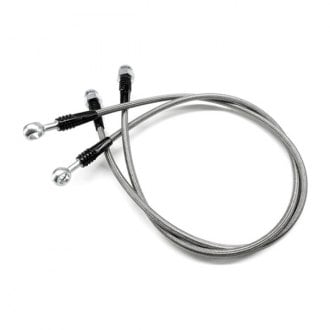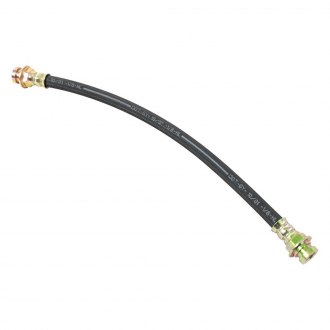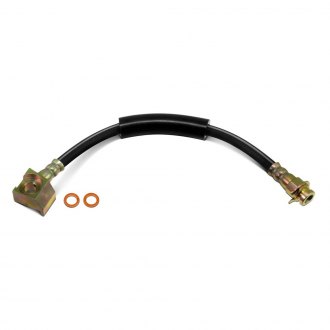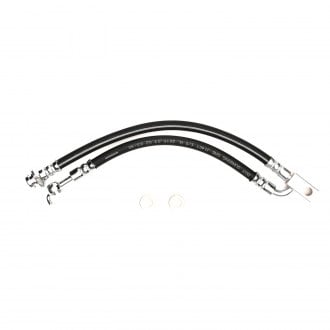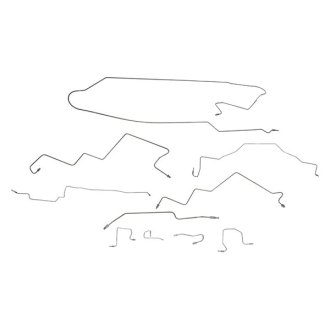Brake Lines & Hoses
Select Department
-
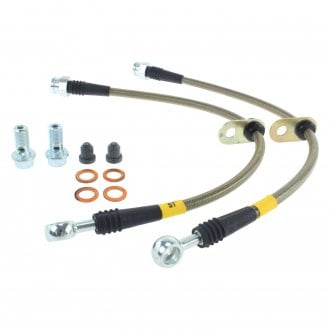 Save 5%StopTech® - Stainless Steel Brake Lines$51.37 - $143.50$54.07 - $151.05Save 5%
Save 5%StopTech® - Stainless Steel Brake Lines$51.37 - $143.50$54.07 - $151.05Save 5% -
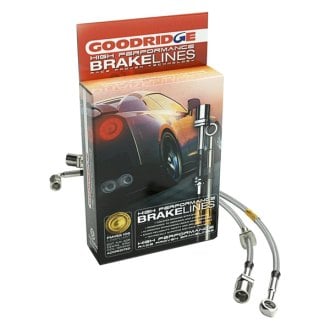 iD FastTrack Extra Save $13.40Goodridge® - G-Stop Brake Line Kit$67.40 - $268.34 + Save up to $13.40 with iD FastTrack
iD FastTrack Extra Save $13.40Goodridge® - G-Stop Brake Line Kit$67.40 - $268.34 + Save up to $13.40 with iD FastTrack -
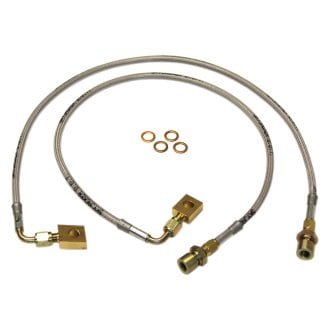 Save 3%Skyjacker® - Stainless Steel Brake Lines$67.31 - $199.62$69.39 - $205.79Save 3%
Save 3%Skyjacker® - Stainless Steel Brake Lines$67.31 - $199.62$69.39 - $205.79Save 3% -
 EBC® - High Performance Stainless Steel Brake Lines$117.36 - $377.14
EBC® - High Performance Stainless Steel Brake Lines$117.36 - $377.14 -
 Save 40%Mopar® - Brake Hydraulic Hose and Line Assembly$35.67 - $45.58$59.87 - $76.45Save 40%
Save 40%Mopar® - Brake Hydraulic Hose and Line Assembly$35.67 - $45.58$59.87 - $76.45Save 40% -
 Synergy Manufacturing® - Brake Line$115.00 - $235.74
Synergy Manufacturing® - Brake Line$115.00 - $235.74 -
 Save up to 40%Mopar® - Brake Hydraulic Line$30.12 - $38.67$43.50 - $64.77Save up to 40%
Save up to 40%Mopar® - Brake Hydraulic Line$30.12 - $38.67$43.50 - $64.77Save up to 40% -
 Save 32%Mopar® - Brake Vacuum Hose$46.77 - $62.04$69.21 - $91.75Save 32%
Save 32%Mopar® - Brake Vacuum Hose$46.77 - $62.04$69.21 - $91.75Save 32% -
 Save 40%Mopar® - Power Brake Booster Vacuum Hose$37.85$63.55Save 40%
Save 40%Mopar® - Power Brake Booster Vacuum Hose$37.85$63.55Save 40% -
 iD FastTrack Extra Save $11.00Goodridge® - Phantom Stainless Steel Brake Lines$148.13 - $258.02 + Save up to $11.00 with iD FastTrack
iD FastTrack Extra Save $11.00Goodridge® - Phantom Stainless Steel Brake Lines$148.13 - $258.02 + Save up to $11.00 with iD FastTrack -
 The Right Stuff® - Conversion Brake Hydraulic Line$117.95 - $194.95
The Right Stuff® - Conversion Brake Hydraulic Line$117.95 - $194.95 -

-

-

-
 ICON® - Brake Line Kit$213.59 - $228.85 + Free Shipping with iD FastTrack
ICON® - Brake Line Kit$213.59 - $228.85 + Free Shipping with iD FastTrack -
 ISR Performance® - Brake Line Kit$120.18 - $188.10
ISR Performance® - Brake Line Kit$120.18 - $188.10 -

-
 Rancho® - rockGEAR™ Stainless Steel Brake Hoses$116.92 - $117.98
Rancho® - rockGEAR™ Stainless Steel Brake Hoses$116.92 - $117.98 -

-
 Rubicon Express® - Stainless Steel Brake Lines$50.55 - $51.37 + Free Shipping with iD FastTrack
Rubicon Express® - Stainless Steel Brake Lines$50.55 - $51.37 + Free Shipping with iD FastTrack -
 Rugged Ridge® - Stainless Steel Brake Hoses$39.99 - $199.99
Rugged Ridge® - Stainless Steel Brake Hoses$39.99 - $199.99 -
 Russell® - Stainless Steel Braided Brake Hoses$73.95 - $233.95
Russell® - Stainless Steel Braided Brake Hoses$73.95 - $233.95 -
 Steinjager® - Brake Hose$10.32
Steinjager® - Brake Hose$10.32 -
 Superlift® - Bullet Proof Stainless Steel Brake Hoses$69.99 - $179.99
Superlift® - Bullet Proof Stainless Steel Brake Hoses$69.99 - $179.99 -

-
 TeraFlex® - Stainless Steel Brake Lines$75.99 - $138.99 + Free Shipping with iD FastTrack
TeraFlex® - Stainless Steel Brake Lines$75.99 - $138.99 + Free Shipping with iD FastTrack -
 iD FastTrack Extra Save $11.10Motorcraft® - Brake Lines$9.69 - $351.50 + Save up to $11.10 with iD FastTrack
iD FastTrack Extra Save $11.10Motorcraft® - Brake Lines$9.69 - $351.50 + Save up to $11.10 with iD FastTrack -
 Dorman® - Brake Hose$7.21 - $96.43
Dorman® - Brake Hose$7.21 - $96.43 -
 Save 5%DFC® - Brake Hose$9.86 - $136.73$10.38 - $143.93Save 5%
Save 5%DFC® - Brake Hose$9.86 - $136.73$10.38 - $143.93Save 5% -
 Dorman® - Brake Hydraulic Line$74.19 - $660.17
Dorman® - Brake Hydraulic Line$74.19 - $660.17
Metal brake lines are subject to corrosion, especially in areas where the roads are salted in winter. Extreme corrosion can perforate the line, causing a fluid leak and the loss of hydraulic pressure. Corrosion can also make fittings seize to the line, causing the line to twist and destroy itself when the fitting is disconnected during service. Due to their location along the frame rails under the vehicle, brake lines are also subject to impact damage from obstacles and debris, which can cause a leak or restriction. Check the lines for dents and other signs of contact damage, especially on trucks and SUVs driven off road.
Brake hoses can exhibit obvious physical damage like cracks, abrasion and bulges, but they can also suffer internal damage as well as harm unintentionally inflicted during service. Cracks can develop as the rubber hardens with age. Abrasion damage results from the brake line rubbing against other components, due to improper routing during installation or installation of a hose that’s too long for the application. Internal damage can be caused by improper clamping during service and contaminated fluid. Internal damage can cause a restriction, resulting in brake drag or pull, or swelling that can result in a spongy pedal.
When brake line replacement is necessary, instead of going through the hassle of cutting and bending tubing and flaring the tube ends, for many vehicles we can offer you prebent brake line kits that are ready for installation. These lines are specifically formed for each application, and have the proper diameter and the right fittings for a complete repair. Plus, they’re made of corrosion resistant stainless steel. We also have a vast assortment of direct replacement brake hoses that are the correct length and have the right fittings for each application, along with the hose clips necessary to complete the job.
Performance driving requires firm, consistent brake pedal feel, and brakes that can be precisely modulated when you’re pushing your car or truck to the limit, and you can’t get that responsiveness with stock rubber brake hoses. Factory hoses are fine for everyday cruising, but expand too much when you’re braking at the edge, leaving you with a mushy pedal feel. Upgrade your brake system to braided stainless steel for a dramatic improvement in pedal feel. We also have everything else needed to complete your performance brake hydraulic system including brake lines and a large selection of fittings.
Another reason for upgrading from original brake hoses is when they’re not long enough to work with suspension modifications. This is especially common on lifted trucks. But you don’t have to fabricate your own custom length braided steel hoses. We offer individual hoses in longer lengths, but we’ve made it even easier by offering application specific hoses and kits designed to work with particular lift heights. These hoses come ready to connect into your OE brake system, but with the longer length you need to accommodate increased suspension travel. Sometimes the brake lines also have to be relocated on certain lifted vehicles, and we carry the custom, application specific brackets that make it easy to do.
Browse by Part Name
Featured Brands
Related Categories
 Brake Rotors
Brake Rotors Disc Brake Pads
Disc Brake Pads Brake Calipers
Brake Calipers Brake Kits
Brake Kits Brake Hardware
Brake Hardware Brake Master Cylinders
Brake Master Cylinders Drum Brake Shoes
Drum Brake Shoes Parking Brakes
Parking Brakes Brake Boosters
Brake Boosters Brake Drums
Brake Drums Brake System Sensors
Brake System Sensors ABS System Parts
ABS System Parts Brake Wheel Cylinders
Brake Wheel Cylinders Backing Plates & Shields
Backing Plates & Shields Vacuum Pumps
Vacuum Pumps Disc Brake Conversions
Disc Brake Conversions Line Lock & Roll Control
Line Lock & Roll Control Brake Cooling
Brake Cooling Brake Fluids & Lubricants
Brake Fluids & Lubricants
Browse by Vehicle
Brake Lines & Hoses Reviews


